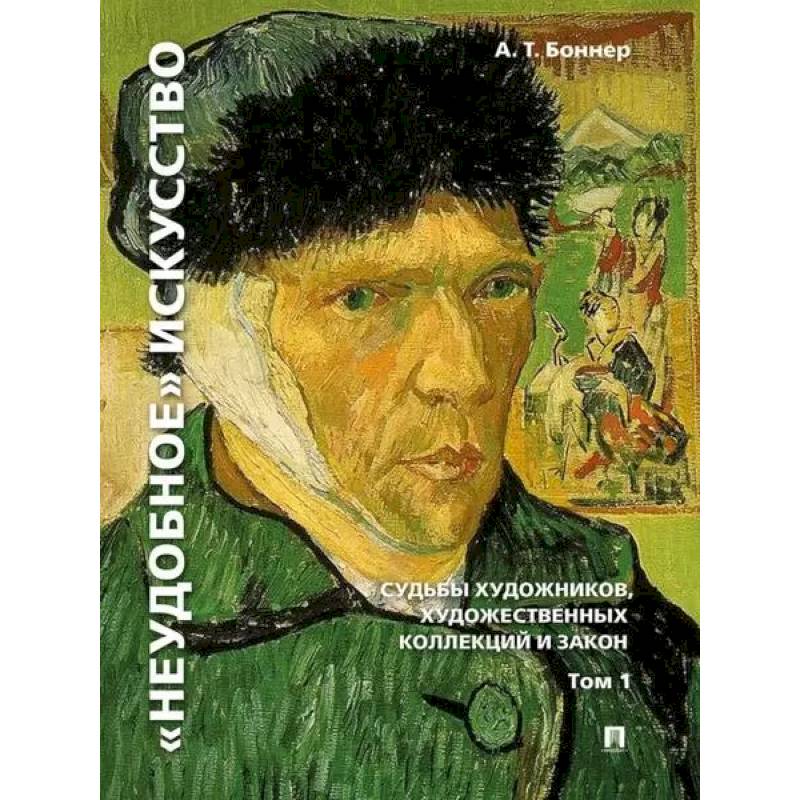"Awkward" Art. The Fate of Artists, Art Collections, and the Law. Volume 1
Please sign in so that we can notify you about a reply
This book may be the most original composition of the famous Russian jurist Professor A. T. Bonner. Its problems are on the verge of fine art and jurisprudence. The author is talking about the fate of artists and collectors, as well as about objects of fine art, which are somehow drawn into orbit of civil, arbitration or criminal proceedings.
As a result, a completely original alloy of popular work and scientific research was obtained.
The book presents images of a number of artists ("customs officer" Rousseau, Gustav Courbet, Vincent Van Gogh, Paul Gauguin, Pablo Picasso, etc) not only as the creators of world -famous masterpieces, but also as living people with their virtues, disadvantages, and sometimes vices. They turned out to be interesting to the author because their life path or the fate of their heritage, due to certain circumstances, turned out to be closely related to various judicial or police trials. In particular, on the basis of a deep analysis of Van Gogh’s letters and Gogen’s books “Before and then, a rather convincing version of the events related to the outskirts of Van Gogh’s ear is proposed. The author of the book does not agree with the well -known version of the death of the artist, allegedly occurring as a result of his suicide.
The work discusses the very acute and controversial problems of restriction of cultural values, the fate of "trophy art", the state of the modern art market and some other phenomena located at the junction of the rights and history of art.
Considering the very vivid ones, finding a response in the judicial and intellectual environment (the case of the claim of Martha Nirenberg against the Government of the Russian Federation on the demand for 17 paintings located in Russian museums, the case of the Madame Saint Arromaniacs against the Louvre about the demand for the painting "Vakhkanalia" , presumably belonging to the brush of the greatest French artist Nikola Pusen and others), the author refutes the old ones and convincingly justifies the new fascinating versions of some events from the world of art. In particular, on the basis of the materials of one of the criminal cases, the false history of the creation of the museum V. A. Tropinin and Moscow artists of his time is exposed and revealed.
When analyzing these and a number of other plots in work, purely procedural issues are also considered (on forensic art history examination, legality, validity and motivation of a court decision, etc).
The present 3rd edition of the book is released in a significantly updated form compared to the two previous ones. It includes a number of new paragraphs, and many other sections are complemented by new interesting material.
For lovers of fine art and jurists, as well as the widest circle of readers.
3rd edition, processed and supplemented
As a result, a completely original alloy of popular work and scientific research was obtained.
The book presents images of a number of artists ("customs officer" Rousseau, Gustav Courbet, Vincent Van Gogh, Paul Gauguin, Pablo Picasso, etc) not only as the creators of world -famous masterpieces, but also as living people with their virtues, disadvantages, and sometimes vices. They turned out to be interesting to the author because their life path or the fate of their heritage, due to certain circumstances, turned out to be closely related to various judicial or police trials. In particular, on the basis of a deep analysis of Van Gogh’s letters and Gogen’s books “Before and then, a rather convincing version of the events related to the outskirts of Van Gogh’s ear is proposed. The author of the book does not agree with the well -known version of the death of the artist, allegedly occurring as a result of his suicide.
The work discusses the very acute and controversial problems of restriction of cultural values, the fate of "trophy art", the state of the modern art market and some other phenomena located at the junction of the rights and history of art.
Considering the very vivid ones, finding a response in the judicial and intellectual environment (the case of the claim of Martha Nirenberg against the Government of the Russian Federation on the demand for 17 paintings located in Russian museums, the case of the Madame Saint Arromaniacs against the Louvre about the demand for the painting "Vakhkanalia" , presumably belonging to the brush of the greatest French artist Nikola Pusen and others), the author refutes the old ones and convincingly justifies the new fascinating versions of some events from the world of art. In particular, on the basis of the materials of one of the criminal cases, the false history of the creation of the museum V. A. Tropinin and Moscow artists of his time is exposed and revealed.
When analyzing these and a number of other plots in work, purely procedural issues are also considered (on forensic art history examination, legality, validity and motivation of a court decision, etc).
The present 3rd edition of the book is released in a significantly updated form compared to the two previous ones. It includes a number of new paragraphs, and many other sections are complemented by new interesting material.
For lovers of fine art and jurists, as well as the widest circle of readers.
3rd edition, processed and supplemented
Author:
Author:Bonner Alexander Timofeevich
Cover:
Cover:Hard
Category:
- Category:Arts & Photography
- Category:Culture
- Category:Reference books
Publication language:
Publication Language:Russian
Paper:
Paper:Offset
ISBN:
ISBN:978-5-9988-1019-0
No reviews found
